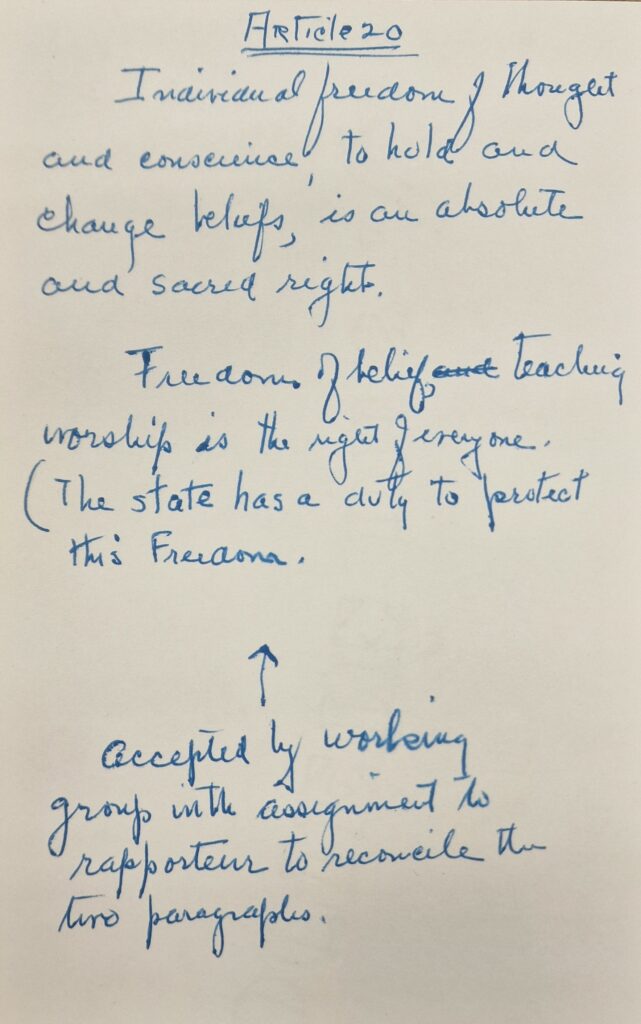The Human Right to Freedom of Thought
One topic of great interest to me is the interpretation or reconstruction of the international human right to freedom of thought (enshrined in numerous human rights documents, Article 18 UDHR, ICCPR; Article 13 ACHR, Article 9 ECHR). First emerging in the UDHR in 1948, it has not been applied in legal practice so far as a distinct right, apart from freedoms of expression or conscience. It has been invoked in only a dozen or so cases worldwide, and even in them, it rarely played a decisive role (if you know of any case addressing freedom of thought, please drop me a line!). Scholarly interest in the right has awakened in recent years, mainly in respect to novel technological interventions into minds and thoughts as well as disinformation. At present, meaning, scope, and limits of the rights are unclear, it is a right in the books only.
I am seeking to draw the contours of a reasonable construal of the right for contemporary challenges, and I am currently writing a monograph on it (under contract with Cambridge University Press, hopefully out in 2025); I have addressed various aspects of the right in different papers. For a general overview, my first paper might be a good start:
- Bublitz, Freedom of Thought in the Age of Neuroscience: A Plea and a Proposal for the Renaissance of a Forgotten Fundamental Right. ARSP: Archiv für Rechts- und Sozialphilosophie / Archives for Philosophy of Law and Social Philosophy 100, No. 1 (2014), 1-25. https://www.jstor.org/stable/24756752
For the history of the right, see this forthcoming paper (largely a legal history addressing details of the drafting of the UDHR but not, to reviewer’s dismay, the extra-legal context or personal views of drafters that led to the adoption of Article 18 UDHR. Historians can draw on much and rich material here, but it is largely irrelevant for legal interpretations of a provision).
- Bublitz, ‘The Mind and Conscience are the Person’s Most Sacred Possessions’: The Origins of Freedom of Thought in the Universal Declaration of Human Rights and the International Covenant on Civil and Political Rights. In: O’Callaghan/Shiner (eds.), The Cambridge Handbook for the Right to Freedom of Thought. CUP (forthcoming 2024).
For general considerations and some suggestions for a contemporary interpretation of the right:
- Bublitz, Freedom of Thought as an International Human Right: Elements of a Theory of a Living Right. In: Blitz/Bublitz (eds.), The Law and Ethics of Freedom of Thought Vol. I. Palgrave (2021), 50-101. [Link]
A related debate concerns Cognitive Liberty, primarily a US-American concept intended as a modernized version of freedom of thought. It is mainly discussed with respect to using and refusing to use or being exposed to mind-altering technologies such as drugs, cognitive enhancements to advertisement and neurotechnologies. On that right, see
- Bublitz, My mind is mine!? Cognitive liberty as a legal concept. In: Hildt/Franke (eds.), Cognitive Enhancement: An interdisciplinary perspective. Springer (2013), 233-264. [Link]
-
- Bublitz, Cognitive Liberty or the International Human Right to Freedom of Thought. In: Jens Clausen & Neil Levy (eds.), Springer Handbook of Neuroethics. Dordrecht: Springer, 2014, S. 1309 – 1334 [link].
- Ligthart/Bublitz/Douglas/Forsberg/Meynen, Rethinking the Right to Freedom of Thought: A Multidisciplinary Analysis. Human Rights Law Review 2022, 22, 1–14. [OA link].
- Bublitz, Freedom of Thought. Encyclopedia of the Philosophy of Law and Social Philosophy, 2023 [link].
Finally, here is a recording of a presentation at the Freedom of Thought Research Network on the history of the right (based on the chapter in the CUP handbook above).
